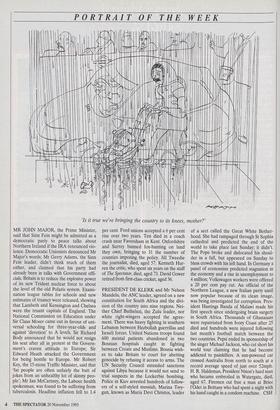PORTRAIT OF THE WEEK
`Is it true we're bringing the country to its knees, mother?'
MR JOHN MAJOR, the Prime Minister, said that Sinn Fein might be admitted as a democratic party to peace talks about Northern Ireland if the IRA renounced vio- lence. Democratic Unionists denounced Mr Major's words; Mr Gerry Adams, the Sinn Fein leader, didn't think much of them either, and claimed that his party had already been in talks with Government offi- cials. Britain is to reduce the explosive power of its new Trident nuclear force to about the level of the old Polaris system. Exami- nation league tables for schools and new estimates of truancy were released, showing that Lambeth and Kensington and Chelsea were the truant capitals of England. The National Commission on Education under Sir Claus Moser came out in favour of uni- versal schooling for three-year-olds and against 'devotion' to A levels. Sir Richard Body announced that he would not resign his seat after all in protest at the Govern- ment's craven attitude to Europe; Sir Edward Heath attacked the Government for being hostile to Europe. Mr Robert Key, the 15-stone Traffic Minister, said that `fat people are often unfairly the butt of jokes from an unhealthy lot of skinny peo- ple'; Mr Ian McCartney, the Labour health spokesman, was found to be suffering from tuberculosis. Headline inflation fell to 1.4 per cent. Ford unions accepted a 6 per cent rise over two years. Ten died in a coach crash near Faversham in Kent. Oxfordshire and Surrey banned fox-hunting on land they own, bringing to 31 the number of counties imposing the policy. Jill Tweedie the journalist, died, aged 57. Kenneth Hur- ren the critic, who spent six years on the staff of The Spectator, died, aged 73. David Gower retired from first-class cricket, aged 36.
PRESIDENT DE KLERK and Mr Nelson Mandela, the ANC leader, agreed on a new constitution for South Africa and the divi- sion of the country into nine regions. Nei- ther Chief Buthelezi, the Zulu leader, nor white right-wingers accepted the agree- ment. There was heavy fighting in southern Lebanon between Hezbollah guerrillas and Israeli forces. United Nations troops found 600 mental patients abandoned in two Bosnian hospitals caught in fighting between Croats and Muslims. Bosnia wish- es to take Britain to court for abetting genocide by refusing it access to arms. The UN Security Council extended sanctions against Libya because it would not send to trial suspects in the Lockerbie bombing. Police in Kiev arrested hundreds of follow- ers of a self-styled messiah, Marina Tsvy- gun, known as Maria Devi Christos, leader
of a sect called the Great White Bother- hood. She had rampaged through St Sophia cathedral and predicted the end of the world to take place last Sunday; it didn't. The Pope broke and dislocated his shoul- der in a fall, but appeared on Sunday to bless crowds with his left hand. In Germany a panel of economists predicted stagnation in the economy and a rise in unemployment to 4 million; Volkswagen workers were offered a 20 per cent pay cut. An official of the Northern League, a new Italian party until now popular because of its clean image, was being investigated for corruption. Pres- ident Hastings Banda of Malawi made his first speech since undergoing brain surgery in South Africa. Thousands of Ghanaians were repatriated from Ivory Coast after 25 died and hundreds were injured following last month's football match between the two countries. Pepsi ended its sponsorship of the singer Michael Jackson, who cut short his world tour claiming that he had become addicted to painkillers. A sun-powered car crossed Australia from north to south at a record average speed of just over 52mph. H. R. Haldeman, President Nixon's hard man who became embroiled in Watergate, died, aged 67. Firemen cut free a man at Briec l'Odet in Brittany who had spent a night with his hand caught in a condom machine. CSH










































































 Previous page
Previous page